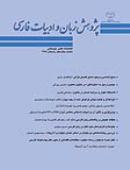مرگانديشي هدايت؛ نگرشي فلسفي يا روانشناسانه؟!
محورهای موضوعی : پژوهشهای ادبیات کلاسیک ایران
1 -
کلید واژه: غريزه مرگ عشق زندگي هدايت فرويد,
چکیده مقاله :
از ديدگاه شماري از منتقدان، صادق هدايت در بيشتر داستانهاي خود، قهرمانانش را به مرگ سوق ميدهد و اين مسئله برآمده از ذهن مرگانديش و فلسفة بدبينانة وي دربارة زندگي است. از معضلات نقد داستان هاي هدايت، يکي همين است که آثارش سرشار از يأس فلسفي دانسته شده و ديگر اينکه شخصيتهاي اصلي داستان پيش را، مثل راوي بوف کور، آيينة شخصيت خود نويسنده ميدانند؛ اما با دقت در بن مايه هاي داستاني هدايت، بايد در مرگ فلسفي اين شخصيت ها به سوء ظن نگريست. هدايت از جمله نويسندگاني است که در ساختار روايت داستانهاي خود، رويکردي ويژه به نمايش جنبههاي رواني شخصيت ها دارد. بنا بر نظرية روانشناسانة فرويد دربارة دو غريزة عشق و مرگ به عنوان دو غريزة اصلي انسان- غريزة عشق به زندگي در پي شکست و نرسيدن به آرزوها در وجود انسان افول کرده و به ناچار جاي خود را به غريزة مرگ مي دهد. در اين مجال، ردپاي اين نظرية روانشناختي در بن ماية داستانهاي هدايت بررسي ميشود.
Many critics believe that Hedayat drives characters of his fictions to death, and this is something arising from his death aware mentality and his pessimistic attitude to life. There are some problems with Critical studies of Hedayat’s stories. First, they see the works full of philosophical despair. Secondly, they treat the protagonists as mirroring the character of the author. However, delving in motives of Hedayat’s stories, one can be suspicious about philosophical treatment of death of the fictional characters. Hedayat is among the writers who have especial approach to reveal psychological aspects of the characters in narrative structure of his stories. According to Freud theory of instincts, human behavior was motivated by two biologically energized instincts, respectively termed Eros, the life instinct, and Thanatos, the death instinct. When the life instinct decays as a result of failure, the death instinct takes the place of it. The research tries to study the stories in this framework.

